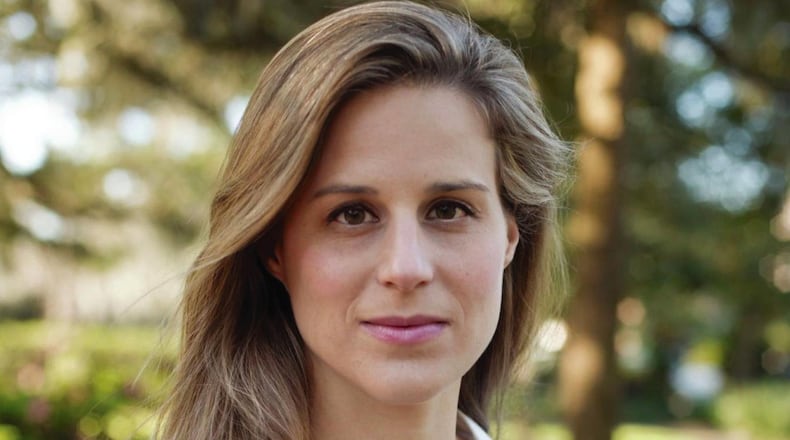Lauren Groff’s highly anticipated new book, “Florida,” is a collection of 11 short stories that first saw the light of day in publications such as The New Yorker and Esquire. The collection was inspired by the author’s move to the state, with Florida being the undercurrent running through each story — even if it’s simply the place characters are fleeing for vacation in France or Salvador, Brazil.
The author's use of the inspirational and mysterious geography as a jumping-off point offers further proof that in capable hands, Florida can become as much of a living, breathing, vengeful character as the most well-developed individual. (For another prime example of such personification, reach for Sarah Gerard's collection of eight nonfiction essays, "Sunshine State.")
The collection is Groff's follow to the acclaimed "Fates and Furies," an epic about a decades-long marriage that President Barack Obama called his favorite novel of the year in 2015. The New York native has also penned novels "Arcadia" and "The Monsters of Templeton" and another collection, "Delicate Edible Birds." Praise from the president is a lot to follow, but there is no evidence of misplaced effort or extraneous struggle in these pages. The collection is best read slowly, without hurry or interruption, allowing the reader to fully lap up the poesy tales.
The dust jacket says the author, who lives in Gainesville, “writes about loneliness, rage, family and the passage of time.” Another word for that list is “despair.” Many of the characters end up in physically straining situations that lead them to have mental breakdowns involving ghosts, hallucinations or heightened sensations. In the only story that’s completely from a male point of view, we follow a man from birth, at a time when “few people lived in the center of Florida,” until he’s a married, old, deaf father. His story culminates with being stranded in a johnboat alone on a lake for hours under the hot sun: “Jude drifted off to sleep, and when he woke, he knew that if he opened his eyes, he would see his father sitting in the bow, glowering.” The helpless man considers diving into the alligator-infested water.
Then there’s the pair of young sisters who had been living in Fort Lauderdale with their wild mom before questionable circumstances leave them abandoned on an unnamed island. We spend days with them there, watching them go from eating tuna fish and Oreos to ChapStick and strange red berries as supplies diminish. They pass time watching “Snow White” on the VCR repeatedly, reading the back of an old cereal box, painting their nails, telling morbid fairy tales. The little sister’s ribs become sharp, yet the older one, with a body “made of air,” is at peace. The description of how they are rescued is deliciously chilling.
There’s the woman who is visited by three ghosts — an adulterous husband, a young lover, her comforting father — after she declines to evacuate during a hurricane. She loses awareness of her body while waiting out the raging storm. The wholly unique and memorable details peppered into Groff’s writing are somehow topped by stolen away scenes; for instance, seeing that when the woman’s father was dying of cancer, she was away exploring an underwater village at Girl Scout camp: “I saw a catfish laying on a platter in the dining room as if serving himself up; he looked at me and shook his head and sagely swam away.”
Isolation is heavily prevalent for a young woman who’d gone to grad school but becomes homeless. It starts out harmlessly enough, a vacation from her life. She drives through deep-country Florida — “Out here, people decorated their yards with big rocks and believed they could talk to God.” — so she can be an oceanside vagrant. But her despondency progresses until she finds herself walking deep into a prairie at night. “She thought of snakes sleeping coiled in their burrows and the alligators surfacing to scent her in the darkness, their shimmy onto the land, their stealthy bellying; how she was only one living lost thing among so many others, not special for being human.”
All the aforementioned characters appear only in their respective stories, but there’s one character who recurs a handful of times: a mother who isn’t identified by a name, but by her two sons, a kind but imperfect husband and her constant worrying about climate change (plastic pull tabs will end up choking the Earth’s last sea turtle) and whether her parenting is subpar (she goes on long walks to avoid yelling at her kids). The mother’s stories are less animalistic than the others, more humanistic. Save for the one where falling on her head leads to a trippy night where she can smell “the mold breathing out new spores, shaken alive by the rain.”
Taken individually, the stories are impactful for their intensity. But read as a collection, they take on an inexplicably cohesive form with a sad-, beautiful- and naked-ness that reverberates in the mind long after the book is shut. In the final story, the mother takes her sons to Yport, France, for August to escape the heat and dread she feels at home, and to research writer Guy de Maupassant. When a seagull flies into her skylight, the mother thinks how the “language she is most fluent in is story”; much the same could be said for Groff. It’s in Yport the mother realizes that she can’t escape her flawed and neurotic self. “Of all the places in the world, she belongs in Florida. How dispiriting, to learn this of herself.”
FICTION
“Florida”
By Lauren Groff
Riverhead Books
288 pages, $27
IN OTHER NEWS:
About the Author
Keep Reading
The Latest
Featured




